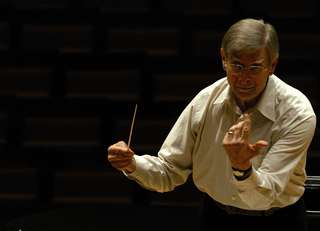|
Back
The Exuberance of Experience New York
David Geffen Hall, Lincoln Center
02/02/2023 - & February 3*, 4, 2023
Ingvar Lidholm: Poesis
Hector Berlioz: Symphonie fantastique (Episodes de la vie d’un artiste), opus 14
Eric Huebner (Pianist)
New York Philharmonic Orchestra, Herbert Blomstedt (Conductor)

H. Blomstedt (© Martin U. K. Lengemann)
“His orchestration is so dirty that I have to wash my hands after turning over the pages of his scores.”
Felix Mendelssohn to Robert Schumann about Hector Berlioz
How gratifying to see a usually staid matinee audience enjoying the joys and nightmares of an Opium Dream. For such were the hallucinogenic elements of Hector Berlioz. And how gratified Hector Berlioz would been to be paired with the frenetic aleatory orchestra of Ingvar Ludholm’s Poesis.
And while one needn’t bring it up, how satisfying to hear Herbert Blomstedt–now in his tenth decade–leading the New York Phil with such a joyous performance of both works.
Nobody would dare call Mr. Blomstedt the “Grand Old Man of the Podium.” His beat is sure and confident, he made certain that the Berlioz didn’t leap into hysteria. And his introduction of the Lidholm work–for which the conductor led the world premiere in 1964–was verbally prefaced by the conductor.
A preface which, had Berlioz’ Treatise on Orchestration been an audiobook, would have sounded like Mr. Blomstedt himself. Not only did he introduce Poesis almost measure by measure, but he imitated every instrument in the orchestra. From the sandpaper rubbing (“for you amateur carpenters”) to the double‑bass glissandi and massive brass!. True, the result showed its half‑century age a bit. No minimalism, no mathematical equations. Rather, we had a complex 18 minutes of wild textures, of violins bowing in different directions, of that sandpaper beginning.
And just for good measure, the Phil’s pianist Eric Huebner sending out clashing chords, a whistle (which was quite out of place), playing inside and outside the box (shades of 1960‑ish David Tudor!). It was all created with dexterous inspiration, and a complex inspiration that the orchestral crescendo was bringing something out of nothing.
Yet even without program notes or Mr. Blomstedt’s introduction, Mr. Lindhom managed to pack lots and lots of fascinating moments.
The grand surprise was how Mr. Blomstedt shaped and phrased every bar of the Fantastic Symphony. Yes, the Phil players and the conductor knew it through countless performances. Yet it was precisely this experience which gave it such clarity.
The winds of the Phil were not simply bucolic in the “Scene in the Fields,” they had a tension, belying its title. The “Ball” resisted heavy waltz tempo, was played with mysterious aura.
As for the last two movements, in which any professional conductor can raise the rafters, guaranteeing audience cheers, Mr. Blomstedt punctuated the medieval Inquisition modes, the eerie opium horror of a demonically bad trip.
And the exhilaration of a conductor who has never allowed eccentricity or affectation to preclude experience and understanding.
Harry Rolnick
|